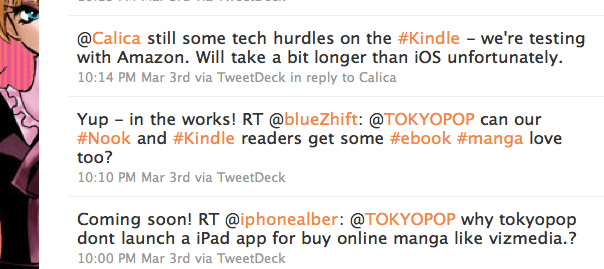Anime News Network reported that the JManga web site had launched with a lineup of titles that included manga never seen in print in the United States. These new titles include Macross Frontier.
 It was the Macross Frontier part that piqued my interest primarily. JManga is a web portal where manga can be purchased and read online in the most popular web browsers. Reading manga online is not new, but being able to do so legally is, for the most part. And any anime or manga fan can attest to the very loud absence of anything Macross Frontier (legally) on US shores. So as a Macross fan, I put aside my general dislike for web based manga reading and signed up for a JManga account to look around.
It was the Macross Frontier part that piqued my interest primarily. JManga is a web portal where manga can be purchased and read online in the most popular web browsers. Reading manga online is not new, but being able to do so legally is, for the most part. And any anime or manga fan can attest to the very loud absence of anything Macross Frontier (legally) on US shores. So as a Macross fan, I put aside my general dislike for web based manga reading and signed up for a JManga account to look around.
Well first, I should note, that at this time Macross Frontier is not yet available on JManga, but still there was quite a lot to see. And I wanted to see if the site would work on my iPad. All of the legal online manga reading sites make use of Adobe Flash based readers which don’t work on Apple iOS devices like the iPhone and iPad. I had hoped to find that JManga was iPad friendly. Unfortunately, the JManga reader is also Flash based and didn’t work on my iPad.
The Flash based manga reader wasn’t really a surprise. But I was surprised and a little disappointed at the price of manga on the site. On JManga, readers buy manga using points. These points are worth a penny a piece. Many titles on the site do not have prices listed as yet, but of those that did, I found the range from 895 to 899 points for a volume. Nine dollars is not a bad price for a printed manga volume, but charging that for digital seems excessive considering that Viz typically charges $5.99 for their iPad friendly digital manga. JManga does have a $10/month subscription plan that currently has a one time bonus of 500 points and then a 50 point/month bonus after that. This brings the cost down a bit, but not enough to escape the fact that they essentially charge print prices for digital.
Pricing aside, I’m happy to see that new titles are being made available to US readers in digital format and hope we’re seeing the beginning of a trend. The general decline of retail bookstores and loss of Borders and publisher Tokyopop in particular has made it more difficult for US manga readers to find new titles. JManga was established by the 39 Japanese publishers who make up the Digital Comic Association with the goal of making manga available worldwide in a fashion that benefits the publishers, artists, and readers alike. If manga is to have a future in the US, JManga is going to be part of it.
With 39 publishers to manage, issues like pricing and availability will take some time to work out. But yes, even at print price I’ll be there for Macross Frontier!

